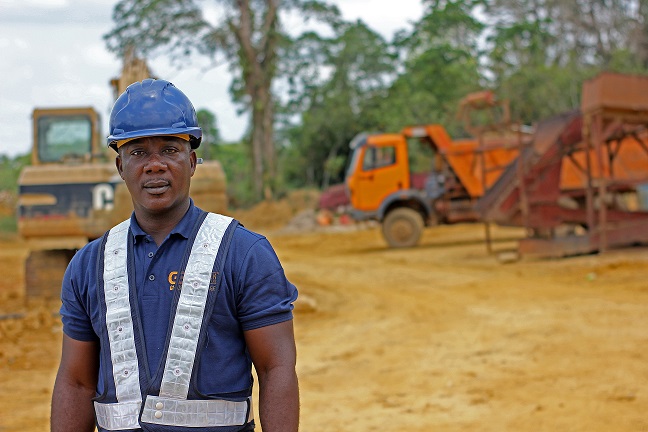
“Whatever new knowledge we acquired, we implemented in our operations to minimize or eliminate the hazards associated with small-scale mining”, said Eric Kwaku Gyamera, General Manager of Gold Bank Resources Ltd.
Through training in sustainable mining, Gold Bank Resources Limited is striving to preserve the environment. The company is licensed by the Minerals Commission of Ghana to mine and produce gold at Mpapatia, a community in the Eastern Region of Ghana. Gold Bank Resources Limited is one of three mines that benefited from the Partnering for Better Livelihoods in the Gold Supply Chain Project.
The project’s objective was to improve the livelihoods of artisanal and small-scale miners and communities around them. Specifically, attention was placed on supporting mines to increase their incomes through improved management and production. The project also focused on increasing the volume of responsible traceable gold from the mines.
The participating mines were therefore introduced to the Fairmined Standard for Gold. The standard ensures artisanal and small-scale mining can be turned into a socially and environmentally responsible activity that creates a positive impact in mining communities. Solidaridad provided capacity building to enable the mines to acquire the skill set to undertake responsible mining.
Workplace health and safety
To improve working conditions in the mines, Solidaridad undertook safety training for all miners to reduce risk in the workplace and respond in emergency situations. Solidaridad also provided several Personal Protective Equipment (PPEs), Safety signages and First Aid and Emergency Response Equipment to increase the Health and Safety Capacity of the mines.
According to Gyamera, the mine has taken various steps to promote health and safety.
“This site is accident-free, we have never recorded any major accident either affecting our personnel or machinery. Safety is our watchword around the mine”.
Environmental Management
One essential requirement of the Fairmined Standard criteria for Artisanal and Small Scale mines (ASMs) is environmental management and ecosystem restoration. The mine was provided with an environmental management plan which indicated activities and control measures that had to be implemented to avoid or minimise environmental impact throughout the mines’ life span. Miners were also trained in environmental management, ecological restoration and ecosystem health, waste management, land rehabilitation and reclamation planning. This was to enable the project mines to become aware of the impact of their activities on the environment and also take measures to address them.
Jonathan Tettey, Site Foreman of Gold Bank Resources Ltd.
Jonathan Tettey has almost 30 years experience in gold mining in Ghana. He is the man leading the environmental sustainability activities of the mine. He remarked that the mine has adopted an eco-friendly mining method around the Akwadum river. The tailings and effluents from the mining process run over series of well-constructed slime settlement ponds and are not discharged directly into the Akwadum river. This protects the river from siltation and pollution.
Gold Bank Resources Ltd, as a result of training received from Solidaridad, does not use mercury in their gold extraction. “We do not use mercury on this mine, we know about the effects on the environment and on human beings”, Gyamera noted. Gold Bank Resources uses washing and panning in its mine.
Community development
The mine recognizes that a cordial relationship with the community where it operates is critical to its survival. As a result, they regularly engage with the Mpapatia Community. They have signed a Joint Memorandum of Understanding (MOU), outlining each the roles and responsibilities of each party.
Owuraku Amofa is the Community Development Officer of the Mine. He explained the company’s relationship with the community. “We have carved a solid relationship with the community because of the exposure we got from Solidaridad. We are offering the young men employment and providing livelihood training to the women in order to improve their economic standing”.
Isaac Ottopa Appiah, trained welder at the mine uses proper equipment and practices.
Inspired by the results
It’s early days yet, but Gold Bank Resource Ltd is hopeful the investment made on its mine will yield economic results.
“In view of the work Solidaridad has supported us to undertake, this site is now used as a model center for small scale mining by the Minerals Commission of Ghana”, Gyamera revealed.
An assessment conducted as part of the project’s conclusion indicates Gold Bank Resources Ltd will be ready for Fairmined Certification Audit in 2017.
About the Better Livelihoods project
The Partnering for Better Livelihoods in the Gold Supply Chain Project was implemented in the Eastern and Ashanti Regions of Ghana from 2014 to March 2017. The overall objective of the project was to improve the livelihoods of artisanal and small-scale miners and communities around them. The project‘s specific objectives included supporting artisanal and small mines to earn more income from improved management and production and increased volume of traceable gold available to buyers at the mine level. As regards to the community component, the project sought to increase awareness of and access to health care, while empowering women economically.
The mine reclaims mined out land within three to six months. Economic trees such as teak and acacia and nitrogen fixing plants will be planted by the mine to reforest the vegetation before the land will be given back to the community.
Learn more about Solidaridad programmes for a sustainable gold sector.
